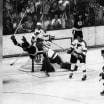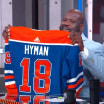The NHL Trade Deadline, both the run-up to it and the post mortem of it, can have a significant impact on how a coaching staff goes about its business.
Unfortunately, most of my experiences in my time as an assistant are when our team was in that selling mode, getting rid of some assets, guys who are going into free agency or guys with a year or two left in order to build with youth and through the draft.
RELATED: [Where every team stands after NHL Trade Deadline | 2018-19 NHL Trade Tracker]
It's difficult to be in that situation because while you understand it and you know what's going on, it doesn't change the feeling you have about your team, your guys. You've worked with your group all year and you feel like you're close, only maybe a couple games under .500, like you're a run away from making it in. But unfortunately for the long term of the organization, the decision is to go with acquiring picks and thinking of the future.
I can remember my first year with Florida (2010-11). We were a team that we felt was somewhat close but we were still out of the race, so we made some moves. I think we were actually on the ice in practice on trade deadline day and they pulled off like four guys because they were traded.
If I remember, it was Radek Dvorak, Chris Higgins, Bryan Allen and Dennis Wideman. We barely had enough guys left to run drills. We had already traded Bryan McCabe, Cory Stillman and Michael Frolik before deadline day.
As a coach, you completely understand why it's happening, but you still hold out hope that maybe it's not going to happen until it does. When it happens, you have to change your thought process because now know you're going to be giving younger guys more of a role and more of an opportunity. Now your mindset as a coach goes into more of the development role, being more patient and doing a lot more teaching than just maybe motivating because you have young guys that need to learn. You change your process of how you're going about things.


















